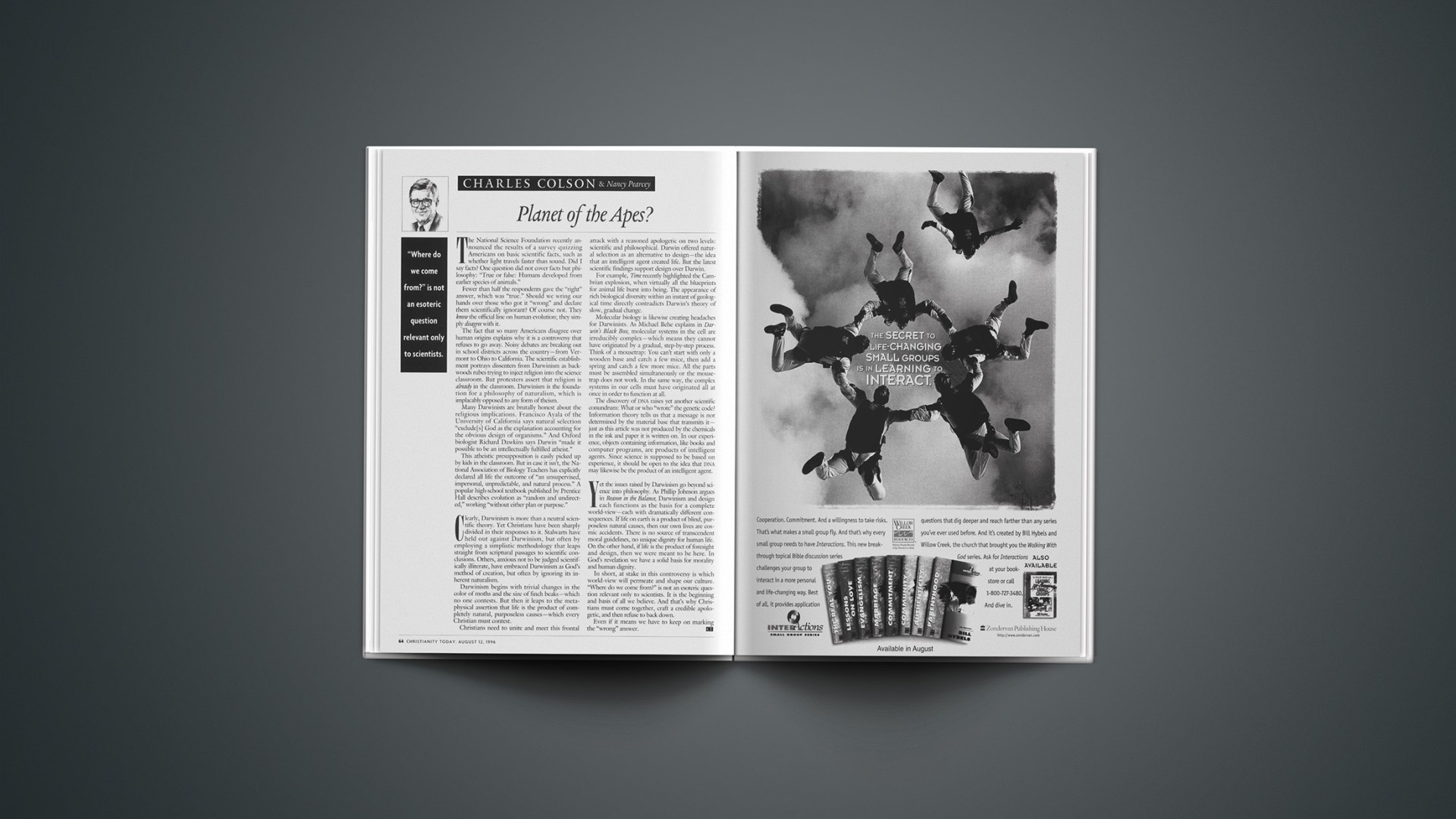The National Science Foundation recently announced the results of a survey quizzing Americans on basic scientific facts, such as whether light travels faster than sound. Did I say facts? One question did not cover facts but philosophy: “True or false: Humans developed from earlier species of animals.”
Fewer than half the respondents gave the “right” answer, which was “true.” Should we wring our hands over those who got it “wrong” and declare them scientifically ignorant? Of course not. They know the official line on human evolution; they simply disagree with it.
The fact that so many Americans disagree over human origins explains why it is a controversy that refuses to go away. Noisy debates are breaking out in school districts across the country–from Vermont to Ohio to California. The scientific establishment portrays dissenters from Darwinism as backwoods rubes trying to inject religion into the science classroom. But protesters assert that religion is already in the classroom. Darwinism is the foundation for a philosophy of naturalism, which is implacably opposed to any form of theism.
Many Darwinists are brutally honest about the religious implications. Francisco Ayala of the University of California says natural selection “exclude[s] God as the explanation accounting for the obvious design of organisms.” And Oxford biologist Richard Dawkins says Darwin “made it possible to be an intellectually fulfilled atheist.”
This atheistic presupposition is easily picked up by kids in the classroom. But in case it isn’t, the National Association of Biology Teachers has explicitly declared all life the outcome of “an unsupervised, impersonal, unpredictable, and natural process.” A popular high-school textbook published by Prentice Hall describes evolution as “random and undirected,” working “without either plan or purpose.”
Clearly, Darwinism is more than a neutral scientific theory. Yet Christians have been sharply divided in their responses to it. Stalwarts have held out against Darwinism, but often by employing a simplistic methodology that leaps straight from scriptural passages to scientific conclusions. Others, anxious not to be judged scientifically illiterate, have embraced Darwinism as God’s method of creation, but often by ignoring its inherent naturalism.
Darwinism begins with trivial changes in the color of moths and the size of finch beaks–which no one contests. But then it leaps to the metaphysical assertion that life is the product of completely natural, purposeless causes–which every Christian must contest.
Christians need to unite and meet this frontal attack with a reasoned apologetic on two levels: scientific and philosophical. Darwin offered natural selection as an alternative to design–the idea that an intelligent agent created life. But the latest scientific findings support design over Darwin.
For example, “Time” recently highlighted the Cambrian explosion, when virtually all the blueprints for animal life burst into being. The appearance of rich biological diversity within an instant of geological time directly contradicts Darwin’s theory of slow, gradual change.
Molecular biology is likewise creating headaches for Darwinists. As Michael Behe explains in “Darwin’s Black Box,” molecular systems in the cell are irreducibly complex–which means they cannot have originated by a gradual, step-by-step process. Think of a mousetrap: You can’t start with only a wooden base and catch a few mice, then add a spring and catch a few more mice. All the parts must be assembled simultaneously or the mousetrap does not work. In the same way, the complex systems in our cells must have originated all at once in order to function at all.
The discovery of DNA raises yet another scientific conundrum: What or who “wrote” the genetic code? Information theory tells us that a message is not determined by the material base that transmits it–just as this article was not produced by the chemicals in the ink and paper it is written on. In our experience, objects containing information, like books and computer programs, are products of intelligent agents. Since science is supposed to be based on experience, it should be open to the idea that DNA may likewise be the product of an intelligent agent.
Yet the issues raised by Darwinism go beyond science into philosophy. As Phillip Johnson argues in “Reason in the Balance,” Darwinism and design each functions as the basis for a complete world-view–each with dramatically different consequences. If life on earth is a product of blind, purposeless natural causes, then our own lives are cosmic accidents. There is no source of transcendent moral guidelines, no unique dignity for human life. On the other hand, if life is the product of foresight and design, then we were meant to be here. In God’s revelation we have a solid basis for morality and human dignity.
In short, at stake in this controversy is which world-view will permeate and shape our culture. “Where do we come from?” is not an esoteric question relevant only to scientists. It is the beginning and basis of all we believe. And that’s why Christians must come together, craft a credible apologetic, and then refuse to back down.
Even if it means we have to keep on marking the “wrong” answer.
Copyright © 1996 Christianity Today. Click for reprint information.










